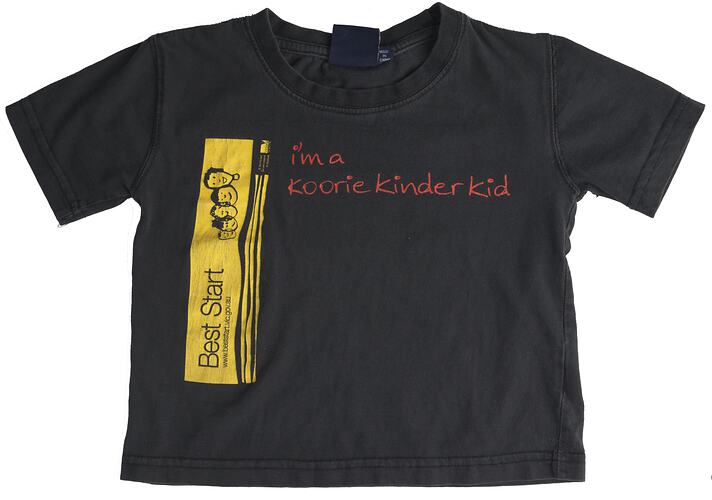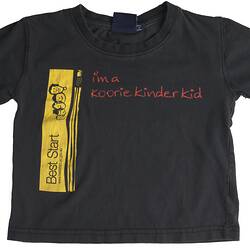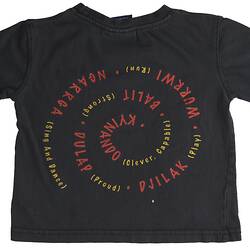Summary
Yorta Yorta and Dhudhuroa man Will Patten reflects on the marked change in the way in which First Peoples and their culture are recognised and acknowledged in educational settings;
'I remember when I first went to Kinder, and I felt like I was a nobody who had no support. I sat in the corner on a bean bag and would not speak to anyone. It's nice to know today that our very young, from the beginning to get go are getting acknowledged and being identified. There is now a strong emphasis on prevention and early intervention in improving our children's development.
Today my children have a strong focus in what they want when it comes to our culture, with all the support we receive today it is a unique experience when working with Aboriginal children, and a total turnaround from when I went to kinder.' Will Patten, 2012.
Physical Description
T-shirt, size 4K, commercially manufactured. Cotton, short sleeved. Black with print in red and yellow ink. Obverse side printed in red: 'I'm a / Koorie Kinder Kid' and 'Best Start' logo printed in yellow. Reverse side, alternating red and black, in spiral design: 'Kyinando (clever, capable), Balit (strong), Dulap (proud), Djilak (play), Wurrwi (run), Ngarrga (sing and dance).'
Significance
It is important for young Aboriginal people to feel pride in the culture and for their culture to be included within their education and wider Australian community. More and more schools throughout Australia are engaging with Aboriginal Elders within their own communities and taking an active role in celebrating Aboriginal and Torres Strait Islander culture through not only events like NAIDOC week but also permanent language programs.
The Victorian Aboriginal Corporation for Languages (VACL) is one of many organisations Australia-wide which is leading the revitalisation of Aboriginal languages. VACL provides many resources which schools, community groups and individuals can access, also promoting language through learning activities in schools and cultural events. The VACL website clearly outlines why language and pride in culture is important for all First Peoples;
'Language is important to Aboriginal people because it is a way for them to express their identity and be proud of where they come from and who they are. If a person knows a word in their language he/she is maintaining a link that has lasted thousands of years, keeping words alive that have been used by their ancestors - language is an ancestral right and it distinguishes something special about Aboriginal people from non-Aboriginal people. Language is a part of culture, and knowledge about culture is a means of empowering people. Language contributes to the wellbeing of Aboriginal communities, strengthens ties between Elders and young people and improves education in general for Indigenous people of all ages.' The Victorian Aboriginal Corporation for Languages (VACL), 2017.
References
Victorian Aboriginal Corporation for Languages
http://www.vaclang.org.au/
More Information
-
Object/Medium
Garment
-
Maker
-
Cultural Groups
-
Locality
-
Fully Extended
390 mm (Length), 560 mm (Width), 15 mm (Height)
-
Classification
-
Date Made
-
Maker
-
Clan/Language Group
-
Place Made
-
Indigenous Region
-
Keywords
-
Type of item
-
Discipline
-
Category
-
Collecting Areas


